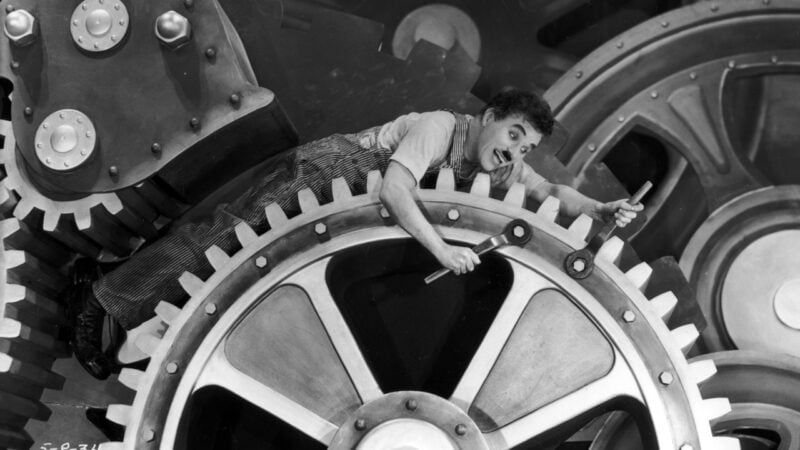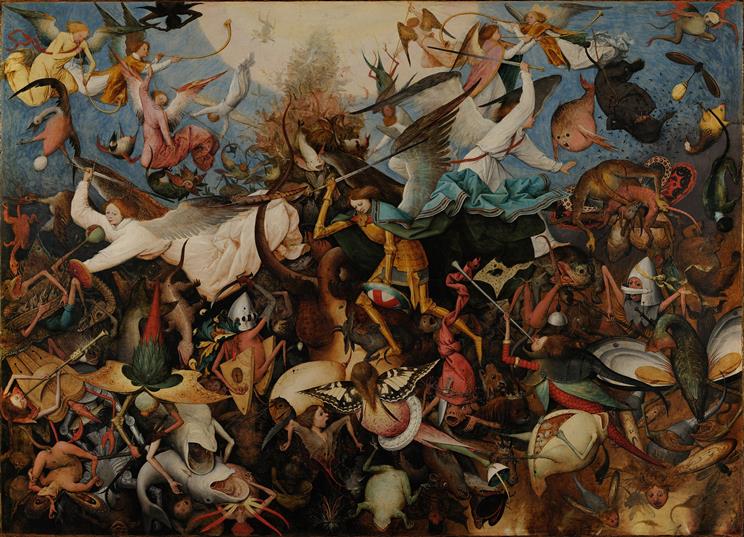I have often complained that the self-styled progressive of our time never tells us where he wants to go. Progress implies a destination, and rest—sweet and blessed rest—once you have arrived. But that would imply a natural human order to return to, or to attain. And then what?
Then what? The progressive sweats. He neither believes in a natural order, nor comes to terms with fallen man and his imperfection. If peace is, as Augustine says, the tranquility of order, the progressive promotes himself as a disturber of the peace. He is too tightly wound to stop. If you live in a town full of such, you will see the pathology all the time, the unrest of people who cannot let things be.
Illustrations are near to hand. Normal people honor their ancestors, accept their bequests with gratitude, and forgive their shortcomings. It is not normal—it is pathological—to despise your ancestors and to want to bring their statues down. Normal people enjoy the reality of male and female. It is not normal—it is dysfunctional—to wish there were one sex, or three, or 30, or none. Normal people accept a statute of limitations when it comes to past sins, and they do not expect human purity around the corner. Sufficient to the day is the trouble thereof. But the progressive rails against any such ease. “Be ye perfect,” he says to his neighbors, “or else.”
But since man cannot take one step if he fears that the ground may collapse beneath him, the progressive must turn to something that promises, if not peace, at least the tense and temporary stasis of a truce. He will not bow to a natural order, but he will lie with awful reverence prone before its evil simular. That is the state-made-god, to which he cedes an ever more intrusive central control over as many features of human life as possible. Thus does a cabal of lawyers in Washington determine who gets a wedding cake from a Christian baker trying to run his business in peace.
We may complain of the immense waste of time, money, and human intelligence that go into this state-made god. But the waste is like recirculating fuel or like some inexhaustible cud for the bull to chew. More waste, more failure, more growth. Let me explain.
The state cannot provide what the Apostle Paul called “the glorious liberty of the children of God.” But it would not do so, even if it could. Spiritual liberty, the inner peace of man with God and his creation, is not in the state’s interest, for the state grows by sickness. It keeps the body politic, its poor patient, in a constant simmering unease, tossing and turning in vain to relieve the sores. Then it plies its patent remedies—and it has the money and the megaphone to hawk them. Trust the good doctor!
Who or what else is there to trust? Not history, which is traduced. Not human nature, which is denied. Not the church, that old maiden aunt the state keeps in the attic, with fancy dress and dolls. We call upon the state. We thereby become state-infected and state-infested. Hence do we sick people become our own quacks.
The phenomenon works in many and mystifying ways, its wonders to perform. We worry obsessively about elections—following them and shoveling money into them and thereby lending a national stage to the most ambitious and treacherous and aggressively stupid among us. Do we have cause to worry? Of course we do. The state makes sure of it. The progressives make sure of it. All interminably unsettled people make sure of it.
But the worry is all to the engrossment of the state. Whether our side wins or loses, our worry is the blood of the state’s heart. So what if the state’s diagnoses are full of lies and contradictions? All the more to worry you, my dear, to jigger our minds by controlling the language we try to think with.
So we parrot the state’s slogans. We too utter verbs without an object: “Choice,” muffling the brute fact that you are choosing to kill your child; “Change,” implying a dissatisfaction with what exists, even going so far as desiring to mutilate yourself or your children. Conservatives themselves will talk about “transgender” people, and after an hour or so, they too forget that they may as well be talking about unicorns on the moon. That is their cowardice speaking—or their exhaustion.
A progressive army, occupied and preoccupied by political agitation, cannot, it appears, win a decisive victory on the battlefield and keep it won. But partial and unsteady victories that embitter the enemy are food for such an army, which grows by managed failure and increasingly turns a suspicious eye against its own citizens. It is not just that peaceable Americans are easier to push around than are mule-riding warlike Afghans in their native mountains. It is that such Americans are the real enemy, because peace and rest are the enemy. Call it the Department of Never Ending Homeland Insecurity. Or the Department of Production for Production’s Sake.
“Progress never defines its ultimate objective,” author John Crowe Ransom said in I’ll Take My Stand, “but thrusts its victims at once into an infinite series. Our vast industrial machine, with its laboratory centers of experimentation, and its far-flung organs of mass production, is like a Prussianized state which is organized strictly for war and can never consent to peace.” Ransom was thinking of an industrialism that forgets that tools are to serve man and his human goods rather than to reduce men to tools or to the slaves of tools. That is a thing of the past, one might say. Shanghai is the new Chicago.
But Ransom’s point remains, though American factories that make tangible things are mostly gone. For other factories—services, we call them, not having lost all our sense of humor—have taken their place. In the old anti-industrial film Modern Times (1936), the assembly line gets into Charlie Chaplin’s neural system and his soul, just as his body accidentally gets caught up in the gears of the machine. Would that it were still!
We no longer work at the machines; we are ourselves the machines, working for work’s sake, ever in need of repairs that are costly, incessant, ineffective, and servile. This too is a progressive demand. Think of how despised a woman is if she dares to leave the machine behind and instead make a home, a place of peace, for her husband and children.

left: Charlie Chaplin in the 1936 film Modern Times (public domain / via Flickr)
But if you want to see the machinae in machina, take a commuter train into any large American city. Note the tension, the rebarbative silence, the unease, the icy hostility—a whole universe away from the merry and spontaneous singing of “The Man on the Flying Trapeze” in the scene on the bus, in It Happened One Night (1934). Women are there too, the social sex; no longer social, though often socialist in politics; self-made eunuchs in the cause of liberation from the old demands of home and family life.
Are they happy? Only their pharmacists know for sure. “Success,” which like “progress” resists definition, is all. People succeed their way to divorce, alienation from their children, anonymity in the neighborhood, sterility in the spiritual life, and the slow fire of resentment against anyone who dares to suggest that the progressive project is all about the increase and multiplication of cravings and demands and hatreds. True tolerance, gratitude, forgiveness, and peace be damned.

Ransom reminds us that a sane pioneer works for the time when he need no longer be a pioneer. “We are unleisurely,” German philosopher Josef Pieper said, translating Aristotle, “so that we may have leisure.” But the progressive fears leisure, just as Pascal’s poor afflicted man cannot sit quiet in his room. And here, as so often, we see the worst of evils when a Christian virtue is detached from the Christian life and from the worship of God, and goes off on its own, destroying.
One who is a pioneer on principle is the Christian soldier gone wrong. The man who will not let his neighbors rest, but who must always be “transgressive,” is one who doubles down on Sodom, tears down a statue here and an institution there, and who lives in ceaseless and unforgiving hatred of anything that can claim to be permanently good and deserving of our honor. He is what you get when sin is transferred from your own heart, where it has settled, to social structures, conveniently vague, and traditions, stolid and defenseless.
The progressive does not examine his own conscience. That dark room is full of mice and spiders. He does not want to sweep those corners. He wants “change,” a restlessness that distracts him from his real evils. “Inspire Change,” reads a tab on the NFL’s website. Not “Marry Your Child’s Mother,” “Live Modestly,” or “Break Your Favorite Filthy Habit.” Everyone, from the cow-eyed sociology major to Hitler, from the drag queen at the local library to publisher Larry Flynt, wants to “make the world a better place.” Nobody wants to do the dishes or change the baby’s diaper. Confess your sins? No fire in that. Better to confess other people’s. “How dare you!” cries the adolescent girl from Sweden.
“The good that I would I do not,” the Apostle Paul said in his Epistle to the Romans, laying bare the contradiction at the heart of fallen man, “but the evil which I would not, that I do.” Who will deliver us from this body of death? Not the harried and harrying progressive. He plays for confusion. So does sin itself.
Sin sends its legions sweeping across the battlefield of the soul; it hardly matters if the legions are disorderly and apt to flee in all directions, since disorder is the aim. To be in bondage to sin is not to sin at all times, but to sin at any time, to know no rest from the urge to do what you wish you would not do, no rest from the fear and the disinclination to do what you know is right, no ease from the bad conscience, the irritability, the mulish persistence in self-justification and excuse-making when you fail in your duty.
War, endless war, war with no aim—that is the banner of Satan the adversary and accuser. Thus the restless instigator in Milton’s poem determines “To wage by force or guile eternal war / Irreconcilable to our grand foe,” no matter that all his actions will make him and his fellows more miserable, as he admits when the other fallen angels are not around to hear him:
Whilst they adore me on the throne of Hell,
With diadem and scepter high advanced,
The lower still I fall, only supreme
In misery: such joy ambition finds.
Satan is like many an environmentalist who hates man more than he loves trees. He cannot let even the natural world alone if it means that Adam and Eve may enjoy their lives in peace and harmony with God. Satan knows that the world is beautiful, but its beauty, the peaceful tranquility of its varied and sweetly interchanging orders, goads him on to hatred. “The more I see / Pleasures about me,” he says, grumbling, “so much more I feel / Torment within me.” And when Adam and Eve fall, condemning the world to fall with them, Death, Satan’s incestuous son and grandson, is not satisfied, because his essential emptiness and nihilism admit no fulfillment, no peace. Says he, beholding a world of living things now given up to ruin:
To me, who with eternal famine pine,
Alike is Hell, or Paradise, or Heaven,
There best where most with ravin I may meet;
Which here, though plenteous, all too little seems
To stuff this maw, this vast unhide-bound corpse.
Bleary-headed moderates, temporizers with death, have thought to buy some peace by condoning this or that progressive madness—for example, by pretending that a man can marry a man. How often do we need to be battered by the next wave of madness to learn the lesson? There is no end. That is the point.

Here we may turn to many a human enterprise that is vitiated or perverted or obliterated by the endless war. I will end by considering one that is near to my heart.
It is easy to note the decline of arts and letters in our time. We need not begin by arguing about quality, when entire genres of the arts have disappeared, and the hard-won and slowly-honed skills necessary to their practice have not been handed down. If you read a dramatic monologue in modern English, you can be almost certain it was not written in our time. The genre has been obliterated. The same goes for every other form of poetry besides the short personal confession and the political screed, mostly in free verse.
The other arts are in an analogous state. It is not just that Cole Porter is gone. The things that Porter did are no longer done. In Porgy and Bess, George Gershwin tried to raise American folk culture and melody to the level of high opera. When was the last time a popular song as hauntingly melodious as “Summertime” was composed? Can anyone recall? Sacred architecture was once translated into an American idiom; it was a living tradition. How many current builders of churches or church-like public buildings drink from the old springs? Can a Saint Patrick’s Cathedral now be built?
You read Robert Frost’s poem “Paul’s Wife,” about the mythical lumberjack Paul Bunyan and how he fashioned a woman from the slender and willowy pith of a tree, and it sings its sad American song, and you know that it could not now be written. No one tells stories in verse, with identifiable characters. But that is not the main reason. Art demands a receptivity from the artist, a patient willingness to wait upon the Muses. The poet must listen before he opens his mouth. The painter must submit in silence to the beauty he beholds. The artist—not the politician or the pornographer using art as his whore or his fast-talking swindler—is close in spirit to a man in contemplation, a man at prayer. The hard work of art is inspired by what is not work at all, but play, praise, and gratitude that is both fecund and filled with repose.
But when political action is the highest social good, when “progress” has infected the brain, men no longer enjoy the spiritual liberty and leisure that are the soil for art. We do not tell stories about the persistent realities of man and his life. They bore us. A boy finds a stray dog, a barkless Basenji, and trains her to be the best bird-dog anyone has ever seen; but then comes an advertisement for the lost dog, and the boy must give her up. Not much to be done there politically; so we can forget about William Wellman’s Goodbye, My Lady (1956). A washed-up boxer tries to begin a new life, and he falls in love with the plain-Jane woman at the employment office who is trying to help him. But his ill-willed manager prevents it, and the boxer reverts to the ring, only now as a pathetic clown of a wrestler. Hard to see any progress there; so we can forget Rod Serling’s teleplay, Requiem for a Heavyweight (1962). Husband and wife are bound in a marriage filled with disappointment, and then the little girl whom they adopted as a baby dies, and they seem to have nothing to live for; but they step back from the brink of divorce. No feminist ground to conquer there, so we can forget George Stevens’ Penny Serenade (1941).
If art tells permanent truths about man, the progressive will not hear them, because he has set his face against anything permanent. It’s not that he produces bad art with drearily predictable political intent. The problem is worse than that. It is that the thing itself, art, suffocates. It needs air, it needs leisure, it needs vistas that span the ages. It needs a humble openness to the eternal. And to the extent that our minds are occupied territory, whether we oppose or cheer the occupiers, we too lose our humanity; we too can neither make nor receive good and great art. The progressive can say with Satan, “Only in destroying I find ease / To my relentless thoughts.” The rest of us can hardly remember what has been destroyed.
“The Fall of the Rebel Angels” 1562 oil painting by Pieter Bruegel the Elder (public domain / via Google Art Project)

Leave a Reply